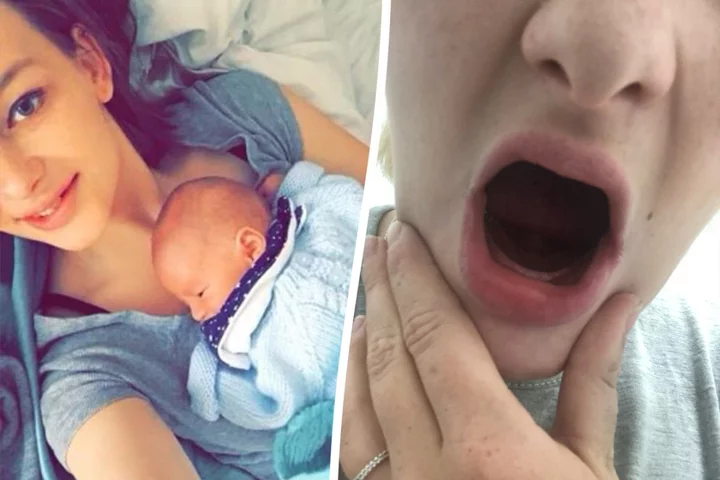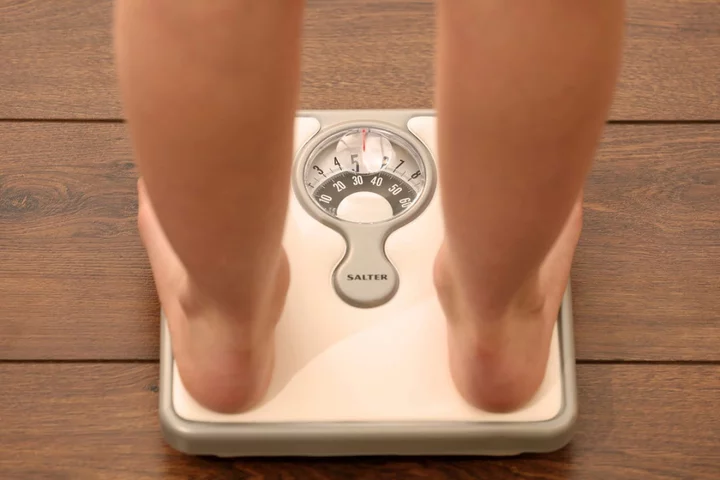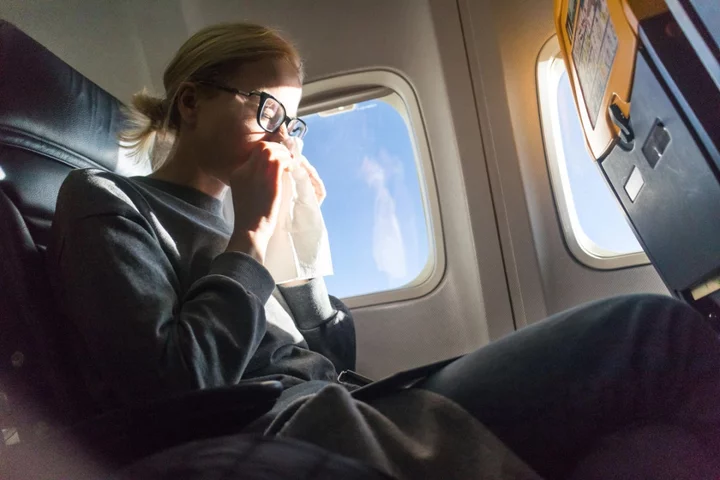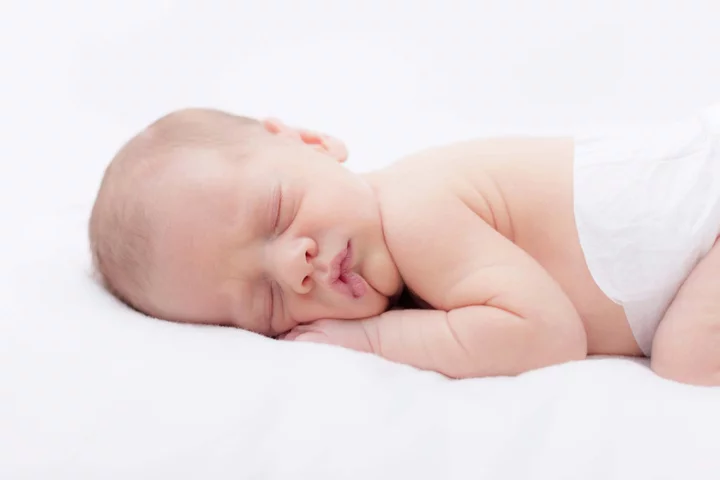
New mum has all teeth removed after rare condition made them fall out during pregnancy
A mum who had her teeth removed after she vomited so much while she was pregnant - has gone on to have more children and embrace life. Louise Cooper, 26, became pregnant for the first time while she was working as a nanny at a ski resort in France. A week after finding out, the mum-of-three said she got so sick she had to move back to the UK. Louise was diagnosed with Hyperemesis Gravidarum (HG) in April 2017 – a condition which affects around 1% of women. Louise would vomit so frequently, her teeth started falling out. Her first child, Zachary, five, was born in November 2017 and six months later Louise had to have all her teeth removed as they were so damaged. Since then, Louise has had two more children, has embraced life without teeth and often goes out without wearing her dentures. Louise, a hairdresser, from Reading, Berkshire, said: “Life is alright now, everything has gone back to normal. “Life is a lot more relaxing and enjoyable. It is not enjoyable when you have HG and are in bed for nine months. “I have embraced having no teeth. I have only really just come to terms with everything in the past year. “It has restricted my diet - I don’t eat a lot of meat anymore. “I mainly stick to eating vegetables.” Louise fell pregnant with her first child in February 2017. A week after she found out she was pregnant, Louise’s sickness was so bad she returned home to be with her family. Three months after falling pregnant, Louise wasn’t getting any better and was bed bound for much of her pregnancy. In April 2017, Louise was diagnosed with Hyperemesis Gravidarum (HG) - excessive nausea and vomiting. Louise said: “The damage was caused by the acid from vomiting. “I lost my first tooth around 16 weeks and it was just out of nowhere. “I was told that my teeth would need to be removed as they were so damaged. “I gave birth to my son in November 2017 and six months after that I had my teeth removed.” After the birth of her son, Louise has had two more children - Ollie, three, and Oakley, 11 months - and every time she has suffered from HG. She said: “HG disappears when the baby is delivered. “However I had more than one child and I have suffered from HG every time. “I would say my diet isn’t the healthiest as it is restricted from trauma. “I have a lot of trauma about food groups, it is so traumatic to go through severe vomiting for nine months - it was none stop. “It is hard to go back into a routine of understanding that food won’t make me vomit anymore. “It was very traumatic, I wouldn’t wish it upon my worst enemy. “A lot of people compare it to the side effects of chemo as you feel like you are dying. “It is unpleasant. It is emotionally and physically draining.” Within the last year, Louise said she has only just managed to come to terms with having no teeth and will now leave the house without her dentures. She said: “I have accepted the fact I have no teeth. “I have dentures now but they are not the most comfortable things to wear as they are cosmetic. “They are also very triggering for the traumatic side of HG. “I can now leave the house without having teeth in. Life is more relaxing and enjoyable for me.” Read More Why are Russian and Belarusian players allowed back at Wimbledon? Matt Hancock seeks to humiliate himself in public again Intermittent fasting ‘no better for weight loss’ than calorie counting British toddler has American accent after watching popular YouTube show GB News in ‘significant breach’ of Ofcom rules over Covid vaccine claims
1970-01-01 08:00

Reading for pleasure in childhood boosts brain health in teenage years – study
Reading for pleasure in early childhood can help youngsters perform better at school and boost their mental health as they enter teenage years, a study suggests. The study of more than 10,000 children found that those who started reading for fun at a young age performed better at cognitive tests and showed improved “brain structure” in adolescence. For “optimal” results, children should be reading for 12 hours every week, academics from the universities of Cambridge and Warwick in the UK, and Fudan University in China, found. Their study, published in the journal Psychological Medicine, analysed data on the children, all from the US, including interviews, cognitive tests, mental and behavioural assessments and brain scans. We encourage parents to do their best to awaken the joy of reading in their children at an early age Professor Jianfeng Feng They then compared information on children who began reading for pleasure before they turned nine against those who started later, or not at all. Of the 10,243 participants studied, just under a half (48%) had little experience of reading for pleasure or did not begin doing so until later in their childhood. The other half had between three and 10 years’ reading for pleasure. Those who started reading for pleasure at a young age were found to perform better on cognitive tests, which measured verbal learning, memory and speech development, and school academic achievement, when they were teenagers. These children also had better mental wellbeing, showing fewer signs of stress and depression, as well as improved attention and fewer behavioural problems such as aggression and rule-breaking. They also tended to use screens less and slept longer. Academics also analysed brain scans of teenagers and found that those who started reading for pleasure at a young age showed moderately larger total brain areas and volumes, and also showed differences in brain regions previously shown to relate to improved mental health, behaviour and attention. “Reading isn’t just a pleasurable experience – it’s widely accepted that it inspires thinking and creativity, increases empathy and reduces stress,” said Professor Barbara Sahakian from the Department of Psychiatry at the University of Cambridge. “But on top of this, we found significant evidence that it’s linked to important developmental factors in children, improving their cognition, mental health, and brain structure, which are cornerstones for future learning and well-being.” Professor Jianfeng Feng from Fudan University in Shanghai, China, and the University of Warwick, added: “We encourage parents to do their best to awaken the joy of reading in their children at an early age. “Done right, this will not only give them pleasure and enjoyment, but will also help their development and encourage long-term reading habits, which may also prove beneficial into adult life.” Read More Charity boss speaks out over ‘traumatic’ encounter with royal aide Ukraine war’s heaviest fight rages in east - follow live Stan Wawrinka on setbacks, preparing for Wimbledon and friendship with Roger Federer Hacks for saving money on school uniforms King Charles and Queen Camilla surprise spa guests in bathrobes at eco-village
1970-01-01 08:00

Stan Wawrinka on setbacks, preparing for Wimbledon and friendship with Roger Federer
With Wimbledon starting next week, Stan Wawrinka is excited about returning to London’s iconic championships. “It’s really a different tournament with the history, also the fact that we play on grass courts. The courts are amazing, the atmosphere is great,” he says on a video call from the All England Lawn Tennis and Croquet Club. Today, the Swiss player is taking a break from his gruelling training schedule to visit SW19 as part of his long-running partnership with Evian. “It’s always special for us players to go practise or to play matches on small courts as well, because you have so many fans coming and the atmosphere is always going to be special,” he continues, saying his most memorable Wimbledon match was against a certain Swiss opponent. “I played one quarter final against Roger [Federer] on Centre Court – it’s always special to play Roger, to play him here was something really nice.” Ahead of the famous championships, the 38-year-old has been training in Monaco, before heading back to London this week. So, how does the three-time Grand Slam winner balance the physical and psychological aspects of preparing for high-profile events? “It’s all a big puzzle,” says Wawrinka, who was born near Lausanne to a German father and Swiss mother. “As a tennis player, you have the fitness side and you have the mental part – you have everything that you need to do to be ready.” Plus, there’s the challenge of having to deal with defeats: “Tennis is a tough sport in the way that you end up almost every week losing. You need to accept [that you will] lose and try to learn and take something positive from it.” How does the former world number three cope with not winning? “I try to refocus on myself, try to also think about everything I’ve been doing in practice… you can lose against a better player. If you know you’re doing the right things, then you can only be positive about it.” Stan the Man (as he’s known to fans) isn’t fazed by comparisons to Federer – whom he’s beaten on just three of the 26 times they’ve competed on court. “I always look for the positive of the situation and I’ve been lucky enough that when I arrived [on the circuit] I was a little bit younger than him – he was already at the top,” says Wawrinka, who is three years younger than his record-breaking countryman. “For me, it was a chance to have Roger in the same country… I had the chance to practise with him and he became a friend.” The pair were victorious at the Davis Cup in 2014 and at the Beijing Olympics in 2008, taking gold in the men’s doubles. “The Olympics are something that any athlete in any sport dreams about, to play individually, but [playing] doubles and to feel like a team it was super special,” Wawrinka recalls. How does training for doubles matches compare to singles? “It’s more the mental part. You need to know your partner, talk with him a lot about the tactics, but more about what’s going to happen. “Communication is really important on the court, but also off the court. For us, it was quite easy to play together because we are such close friends.” Seen as a late bloomer in terms of tennis, Wawrinka admits it was a struggle waiting to achieve his inaugural Grand Slam title at the Australian Open in 2014. “For me, the most challenging part was to find the confidence in myself and in my game. I only won my first Grand Slam at 29 years old, it took me a while to really find that confidence.” Suffering setbacks throughout his career due to knee, elbow and foot injuries, Wawrinka’s ranking has yo-yoed in the past few years, but he returned to the world top 100 in February. “It was tough to be back at 37 years old after more than a year out for another two surgeries,” he says. “It was not easy, but for me, it’s about the passion. I love what I’m doing, I enjoy the process… it was, of course, so special to be back again in the top 100.” Off the court, he unwinds by spending time with daughter Alexia, 13, whom he shares with ex-wife Ilham Vuilloud, a Swiss TV presenter: “I’m traveling a lot so I don’t have that much time to be with her, so I’m trying to enjoy that.” Having grown up on his parents’ biodynamic farm, the tennis champ has inherited the green-fingered gene, growing fruit and veg in his garden back home in Switzerland. “I have tomatoes, courgettes, I have many fruits. I think it’s just different when you have your own garden than when you go buy it at the shop directly.” Reducing his impact on the environment is also a priority for the Evian global brand ambassador, which is why he’s pleased the water brand is introducing refillable bottles for players at Wimbledon for the first time this year. “It’s important for us, the players, [because] we’re traveling a lot – this new bottle is going to be great,” Wawrinka says. Two years away from 40 and with 16 career titles and 550 career wins under his belt, he’s not planning on hanging up his racket any time soon. “I’m still hoping to play a few more years on tour. It’s, of course, not easy, but I’m passionate about it. I want to enjoy it as much as I can,” Wawrinka says. “The time I will stop there will be no way back, so I need to really push and try to be as good as I can.” Evian, official water of the Championships, together with Wimbledon have launched a new refillable solution to hydrate players on court during this year’s tournament. Discover more at www.evian.com. Read More Charity boss speaks out over ‘traumatic’ encounter with royal aide Ukraine war’s heaviest fight rages in east - follow live Hacks for saving money on school uniforms King Charles and Queen Camilla surprise spa guests in bathrobes at eco-village Nearly 1.5m 18 and under referred for mental health support in 2022 – charity
1970-01-01 08:00

Intermittent fasting ‘no better for weight loss’ than calorie counting
Time-restricted eating, commonly known as intermittent fasting, may produce similar weight loss results for adults with obesity compared to traditional calorie counting, according to a new study. The small clinical trial, whose results were published on Tuesday in the journal Annals of Internal Medicine, found that participants who engaged in 8-hour time restricted eating had improved insulin sensitivity compared to those in the control group who ate their calories any time over 10 or more hours a day. Over a billion people worldwide are obese with the with the disease projected to grow in prevalence across the globe, according to the World Health Organization. Obesity has also been found to be a serious risk factor for other metabolic diseases such as type 2 diabetes, heart disease, and some types of cancer. A widely adopted tried-and-tested method to lose weight is to burn more calories than one consumes, and to achieve this, individuals typically count the calories of the food they eat each day. While this traditional approach for losing weight involves counting calories, time-restricted eating, without calorie counting, has also emerged as a popular strategy as it is easier to follow. However, whether intermittent fasting is as effective in producing weight loss, especially beyond the short term, has remained unclear. In the new research, scientists from the University of Illinois Chicago studied 90 adults with obesity from the Greater Chicago area to determine whether intermittent fasting or calorie restricted eating would be more effective for weight control and heart disease risk reduction. Researchers randomly assigned participants to 1 of 3 groups: 8-hour time-restricted eating from noon to 8:00 pm only without calorie counting; reducing a fourth of their calories daily; or no change in calorie consumption with eating taking place over 10 hours or more throughout the day. Participants who followed time-restricted eating and those adopting calorie restriction met regularly with a dietician. The study found that participants who engaged in time-restricted eating ate 425 fewer calories per day than the control group and lost about 4.5kg (10lb) more than the control group after one year. On the other hand, the calorie-restricted group ate 405 fewer calories per day and lost about 5.5kg (12lb) more after one year, with participants in both groups showing high adherence to their interventions. Scientists believe the new study and its findings can help make better-informed clinical decisions by taking individual preferences into consideration, rather than just choosing a diet that may be more effective. Researchers also point out that access to dieticians likely helped the participants make healthier food choices. As there was substantial individual variability in weight loss among participants using these interventions, they called for further research to determine who would most benefit from each of these diet choices. Read More Scientist behind Ozempic says drug can make life ‘so miserably boring’ Teens with severe obesity are turning to surgery and new weight loss drugs, despite controversy Two children were born with ‘insatiable hunger’ that left them severely obese. Now scientists know why British toddler has American accent after watching popular YouTube show GB News in ‘significant breach’ of Ofcom rules over Covid vaccine claims NHS unions vote to accept government pay deal – but nurses could still strike
1970-01-01 08:00

Jonnie Irwin makes rare red carpet appearance as he says ‘every day is a gift’
Jonnie Irwin has said that he “takes every day as a gift as it comes” amid his treatment for terminal cancer. The A Place in the Sun presenter, 49, made a rare red carpet appearance at the Television and Radio Industries Club (TRIC) Awards on Tuesday night (27 June) in London. Irwin also spoke about the support he has received from the BBC’s Escape To The Country production team and said they “put their arm around me” after he divulged his diagnosis. The TV host publicly revealed that he had been diagnosed with lung cancer that had spread to his brain in November 2022, after keeping it a secret among close friends and family for two years. He told The Mirror at the TRIC Awards: “Today is a good day. Yesterday I peeled myself out of bed and munched painkillers but so far so good today. I take every day as a gift and as it comes.” Irwin previously claimed that Channel 4 “pushed him aside for someone healthier” after discovering his terminal cancer diagnosis and told him they didn’t “think they can get the insurance”. He spoke of being “heartbroken” by the broadcaster, adding: “I just feel I’d earned a bit more from them after 18 years”. Channel 4 representatives said the production company “were unable to secure adequate insurance cover” for Irwin. However, Irwin had nothing but praise for Escape To The Country, which he described as “family” to him. “With a notable exception from one production company, as soon as they found out they put their arm around me and, insurance provided, they looked for work when I could,” he said. “So any location that was anywhere near me I was [the] first candidate for and they really helped me find work. They were understanding, especially with travel arrangements. They were so supportive, I can’t thank them enough.” Escape To The Country was nominated for the Daytime TV award at the event, alongside A Place in the Sun. The latter won the category at the end of the night. Prior to the winners being announced, Irwin described the production team as “family” and said the nomination was “recognition” for all their work. “I’ve worked on Escape for coming up to 10 years, but 20 years in the industry and I’ve had the most fun and it’s the most like a family of all the shows I’ve done,” he added. When he first revealed his diagnosis, Irwin said he “doesn’t know how long” he has left to live, but hopes he will inspire people to “make the most of every day”. Earlier this month, he celebrated his “best ever” Father’s Day with his three sons, four-and-a-half-year-old Rex and three-year-old twins Rafa and Cormac. He shares his children with wife Jessica Holmes. It came after he revealed in an interview with Hello! magazine ahead of Father’s Day that he has not told his sons about his terminal cancer, saying it would “be horrible news that they’d have to get their heads around”. “And it would confuse the hell out of Rex – he’s got a shocking enough day coming,” Irwin said. “Let’s bury our heads in the sand for as long as possible.” Read More Walk this way... but not like that: How men’s walks became sexualised Jennifer Lawrence addresses Liam Hemsworth affair rumours after Miley Cyrus’s ‘Flowers’ music video ‘I don’t deserve this’: Tom Hanks’ niece has screaming meltdown on Claim to Fame Jonnie Irwin celebrates ‘best Father’s Day ever’ amid terminal cancer diagnosis Jonnie Irwin ‘removes himself’ from family home amid terminal cancer battle Nicolas Cage once bought seat on plane for son’s imaginary friend, Minnie Driver says
1970-01-01 08:00

Nicolas Cage once bought a seat on plane for son’s imaginary friend, according to Minnie Driver
Nicolas Cage fans are praising the actor after Minnie Driver revealed he once purchased a plane seat for his son’s imaginary friend. Driver shared the story about the National Treasure star, 59, who is father to sons Kal-El, 17, and Weston, 32, from previous relationships, and daughter August, nine months, with wife Riko Shibata, on Instagram on Monday in response to a viral post about Cage. The post, which was shared by the Instagram account @Iamthirtyaf and included an amusing roundup of tweets, memes and anecdotes about Cage, prompted Driver to share her own story about the actor. “Was once on a plane with NC and his son and a seat had also been purchased for his son’s imaginary friend,” Driver wrote in the comments under the viral post. She concluded her comment with a black heart emoji. The anecdote was met with joy from Instagram users, with many praising Cage for the “sweet” parenting moment. “This is amazing,” one person commented, while another said: “That’s so sweet!” “Thank you for sharing that very Nicholas Cage sweet thing to do,” someone else wrote. While the majority of responses to the story were positive, Driver’s recollection prompted one person to joke about a possible alternative reason Cage may have purchased the extra seat on the plane. “Think he just didn’t want anyone else sitting in their row?” they wrote. “Now that’s a whole new level of wealth,” another person commented. Although Cage has not addressed the anecdote himself, he has spoken candidly about the joy fatherhood brings him on a number of occasions. In 2015, Cage opened up about becoming a grandfather after his eldest son, Weston, had children of his own while speaking to People, with the actor telling the outlet: “To see my son with my grandson is as close to a sense of blissful completion I ever had.” In April 2022, after a representative for Cage confirmed that he and Shibata were expecting their first child together,The Unbearable Weight of Massive Talent star told Access Hollywood that he was “extremely excited” to be a father again. “My boys are all grown up, and I miss going to the toy store. I miss singing lullabies and rocking in the rocking chair,” he said. “I’m looking forward to getting back to that.” The couple, who married in February of last year, welcomed their daughter on 7 September 2022. The Independent has contacted a representative for Cage for comment. Read More Nicolas Cage says he remembers being in his mother’s womb Nicolas Cage explains why he prefers the term ‘thespian’ to ‘actor’: ‘Sorry if that is pretentious’ British toddler has American accent after watching popular YouTube show How do I get a mammogram screening? Hacks for saving money on school uniforms
1970-01-01 08:00

Braves Rumors: 4 trade targets to address 3 biggest needs
Breaking down four Braves trade targets for each of the three biggest needs in Atlanta to hopefully secure another World Series win.The Atlanta Braves just keep winning baseball games and it becomes more difficult with each victory to not think about the franchise winning its second World Series...
1970-01-01 08:00

Hacks for saving money on school uniforms
Parents and carers of children in secondary school are still spending “exorbitant amounts” on school uniforms, a charity has said. According to research conducted by The Children’s Society, which surveyed 2,000 parents across the UK in May, on average they are spending £422 per year on uniforms and £287 for primary school children. The survey found that on average pupils were expected to have three branded items, with 29% of secondary school pupils expected to own up to five branded items including PE kits, and 13% expected to have at least seven. So how exactly can parents and carers save money on school uniforms? Buy secondhand Sometimes there’s a means to buy secondhand uniforms at the school through the Parent Teacher Association, Matthew Easter, chairman of The Schoolwear Association, says. But if this isn’t the case, he adds: “Parents should challenge schools and members of staff to provide better financial support to parents.” Parents can even ask the school to reach an agreement with their recommended retail partner, to help them save money. “Have a look on local Facebook sites or sometimes schools have secondhand sales themselves,” advises teacher, mother and money saving expert Sophie Bradbury. “Sometimes you can get uniform that’s barely been worn as someone’s grown out of it too quickly. If you know anyone with children in their older years, ask them. Chances are they’ve still got some old jumpers or polo shirts hanging around. “Also check out your local charity shops and make sure to ask if they have any uniform out the back. Charity shops don’t put everything out straight away, so it’s always worth an ask. [You can also try] car boot sales. I always see old uniforms going for pennies.” It’s great when siblings attend the same school too, because you can pass down their old items. Buy good quality uniform that lasts It’s tempting to buy cheap school uniforms, but for Easter suggests it’s better to focus on quality over quantity. Easter is a parent of two girls aged seven and 10, and understands the strain it can put on families. “School uniforms are unique pieces of clothing, because pupils wear it for at least 196 days every year. It hardly changes too and doesn’t get lost as much as parents think – it’s only a small proportion. So why not invest in quality branded clothing that will last your child for a few years? “It means you can focus on purchasing the quality staple branded items, including a blazer, jumper – depending on the school – and tie from recommended retailers and then get skirts, trousers, white shirts, shoes and anything else required from independent retailers or supermarkets on the high street.” In reality, Easter suggests parents end up spending more in a shorter space of time buying lower quality uniforms, because they might need to be replaced. Buy it big so you get more out of it Uniforms tend not to be a one-time cost: you’ll have to buy replacements whenever you child has a growth spurt and the garments no longer fit. An easy hack to minimising the amount of new uniforms you have to buy? Buy the items a bit too big, giving your child time to grow into it. Recycle or upcycle Clothing is one of the world’s most polluting industries, so don’t throw your uniform away. You can always donate them to organisations that upcycle and recycle school uniforms, such as the Re:Form scheme (run by Trutex), which sells pre-owned uniforms at reduced prices. Or organisations like Pickni Uniforms, founded by Croydon rapper Jords and his friend Jamahl Rowl, which collaborates with schools, community organisations, and social service agencies to provide free school uniforms to students from low economic backgrounds. Read More Charity boss speaks out over ‘traumatic’ encounter with royal aide Ukraine war’s heaviest fight rages in east - follow live King Charles and Queen Camilla surprise spa guests in bathrobes at eco-village Nearly 1.5m 18 and under referred for mental health support in 2022 – charity Holiday hygiene horrors: Summer health risks to avoid, from flying to hotels
1970-01-01 08:00

Nearly 1.5m 18 and under referred for mental health support in 2022 – charity
Almost 1.5 million people aged 18 and under were referred for mental health support in 2022, according to a youth mental health charity. According to YoungMinds’ analysis of data from NHS Digital, there were 1,425,193 referrals last year, a rise of 76% since 2019. The charity also said it is the second consecutive year that referrals have topped one million. Laura Bunt, chief executive of YoungMinds, said: “Every day without action is another day thousands of young people are without the mental health support they need. Behind every number is a young person facing impossible challenges.” In April 2022, the Government made a call for evidence for a new 10-year mental health plan. Any new plan for the NHS workforce needs to include significant measures to increase the numbers of mental health specialists we have working in children and young people's mental health services Tom Madders, YoungMinds As part of the call, 13,887 people under the age of 25 completed a YoungMinds survey and the answers were shared anonymously with the Government. Ms Blunt said those who responded made it “loud and clear what change was needed”. However, the plan was shelved in favour of the Major Conditions Strategy, which grouped mental illness together with the likes of cancer and chronic respiratory diseases. The call for evidence for the new strategy ends on Tuesday. In response, YoungMinds and a group of young people will take two vans to Westminster displaying messages from some of the people who responded to the initial call over the 10-year mental health plan. Ms Blunt added: “Twelve months on, as the situation worsens, we are still waiting. The Government had an opportunity to hear from young people and take action that could transform the system, but all we’ve seen is delay. “The Government must listen to young people and commit to action that drives down numbers of young people needing support, prioritises early intervention, and properly funds mental health services.” Tom Madders, director of communications and campaigns at YoungMinds, said: “This explosion in referral numbers has led to wait times being as long as two years in parts of the country. “One of the biggest barriers for getting wait times down is the lack of staff and young people are paying the price for a total absence of workforce planning over the past few years.” On Sunday, Prime Minister Rishi Sunak said the NHS Workforce Plan, a 15-year blueprint outlining how the NHS will retain and recruit staff, will be published this week. Mr Madders added: “Any new plan for the NHS workforce needs to include significant measures to increase the numbers of mental health specialists we have working in children and young people’s mental health services.” Read More Charity boss speaks out over ‘traumatic’ encounter with royal aide Ukraine war’s heaviest fight rages in east - follow live Holiday hygiene horrors: Summer health risks to avoid, from flying to hotels Pretty garden plants you didn’t know you could eat Group B Strep: 8 things every parent should know
1970-01-01 08:00

Holiday hygiene horrors: Summer health risks to avoid, from flying to hotels
Nobody likes getting sick, and illness on holiday is even worse – who wants to waste their precious vacation days lying in bed when they could be out having fun? Unfortunately, the chances of catching a bug can be high when you’re travelling. From airports and planes crammed with passengers to hotel rooms and restaurants with questionable cleanliness (even if it’s not visible to the naked eye), no wonder so many of us end up with the lurgy abroad. Here, health experts discuss the major health risks that occur on summer holidays and how to avoid them. Airports “Airports often become crowded and therefore they present multiple hygiene risks,” suggests Dr Donald Grant from The Independent Pharmacy. “Touching surfaces, using airport bathrooms and being in close proximity to others can cause bacteria to spread, so it’s important to be hygiene-alert.” Plus, having to hand your passport, boarding pass and luggage to different staff members increases the number of touchpoints throughout your journey. Dr Angela Rai, GP from the London General Practice recommends regularly washing your hands or applying hand sanitiser as you make your way through the airport. She says: “Washing your hands or using hand sanitiser helps reduce the risk of transmission of lots of different infections, including viral infections, coughs and colds and potentially gastrointestinal infections as well.” Flying “If someone is sitting next to you [on an airplane] and they have a cold, it may well be that you might catch one,” says Dr Preethi Daniel, deputy medical director at London Doctors Clinic. “There are hundreds of viruses that cause illness and the fact that you are mixing with people from all over the world means exposure to viruses and bugs your body may not be used to already.” It’s not only airborne bugs that you have to worry about, says Grant: “Again, it’s important to wash or sanitise your hands frequently during your flight, especially before eating or drinking, after using the bathroom, or if you’ve touched your armrest, tray table or TV screen.” As an extra precaution, you might also want to wipe down your down your table and armrests with an antibacterial wipe. Hotel rooms “While all hotel rooms should be thoroughly cleaned between each guest’s stay, you can never be fully sure that your room is bacteria-free,” says Grant. “To be on the safe side, take some disinfectant wipes and give the surfaces a good wipe down when you arrive — and don’t forget the TV remote, which may have been handled by hundreds of people without being cleaned.” Be extra careful with eating and drinking utensils in your room, he adds: “You should avoid using drinking glasses or mugs provided by the hotel without cleaning them thoroughly first.” Food and drink When eating and drinking at local spots abroad, Daniel’s advice is to “check for cleanliness even in established restaurants; paying particular attention to the state of tablecloths, cutlery, glasses and whether the tables are wiped down properly”. Look out for flies on food as well, she warns: “They are often loaded with pathogens as they do not discriminate between feeding on food or faeces. “E. coli, salmonella or shigella are some of the most common causes of gastrointestinal infections on holiday. “Hepatitis A and typhoid are other infections you can contract from contaminated food or water.” Never drink tap water unless you know it’s safe, and beware of tap water being used in food and drink prep. Rai says to be careful with ice as it might have been made with tap water and “things like salads and raw vegetables that have been washed in that water”. “Stick to peelable fruit,” Daniel adds. “Bananas, mangoes and the like are perfectly fine to eat. Avoid anything that has already been peeled, chopped and is waiting in handy takeaway sizes for you.” Swimwear and towels “Unpleasant odours and growth of bacteria are some of the risks of poor hygiene when it comes to swimwear and beach towels,” says Daniel. “They trap moisture”, which could leave you vulnerable to “getting infections such as bacterial vaginosis or thrush”. Grant says: “Be mindful that your towel is likely getting dirtier on holiday than it would be at home — especially if you’re taking it to the beach or the pool. You should change or wash your towel at least every other day.” And unless you’ve got a different swimsuit for every day of the holiday, you’ll need to give it a wash. “You’re meant to wash your swimwear after every time you wear it, because you have to treat it like your underwear,” says Rai. Haven’t got access to a washing machine on holiday? Rai says: “Just gently hand wash your swimwear every time you use it with warm soapy water then hang it up to dry.” Read More Charity boss speaks out over ‘traumatic’ encounter with royal aide Ukraine war’s heaviest fight rages in east - follow live Pretty garden plants you didn’t know you could eat Group B Strep: 8 things every parent should know Princess Diana’s ‘black sheep’ jumper predicted to sell at auction for up to £70,000
1970-01-01 08:00

Strictly’s Amy Dowden gives health update after getting new breast following mastectomy
Amy Dowden has said she showed her reconstructed breast to her former Strictly Come Dancing co-star Sara Davies, after undergoing a mastectomy to treat breast cancer. The professional dancer revealed that Davies was helping to adminiser an injection as she continues to recover from her operation, which took place two weeks ago. Dowden, 32, also spoke about her surgery in more detail via her Instagram Stories and said she had “no choice” but to undergo a full mastectomy because she had “more than one tumour”. In May, the TV star revealed she had been diagnosed with grade three breast cancer, which is the most aggressive grade, but doctors caught it early. She also suffers from Crohn’s disease and has been praised for raising awareness of the condition. She posted an Instagram Story with Davies on Monday (26 June) and explained that she had to give herself a new injection using a syringe rather than a pen, and Davies was there to help her. “I’ve not done it on my own before so guess who’s going to do it with me?” she said, before gesturing towards Davies, who smiled at the camera. “You don’t mind, do you? Also, what did I show you last night?” Davies replied: “I got to see the new boob. It’s a nice boob!” Amy laughed as she said that Davis suggested she should “get the other one done”. “I just said, that is one good-looking boob!” the former Dragon’s Den star clarified. “Marvellous job. Fantastic!” Dowden added: “Other than the nipple, you wouldn’t really know, would you?” In another video, the dancer explained that after her mastectomy, doctors were able to “put the implant in” her breast rather than an “expander” to help stretch the skin for a later surgery. “For me, it’s a better option because [it means] no more surgery. I woke up and they’d managed to put the implant in, so I have had reconstruction,” she told fans. “I believe later on you can have the nipple tattooed – not sure if I’m gonna do that yet.” Dowden’s post-surgery recovery comes as the Duchess of York is recuperating from her own mastectomy, after it was confirmed this week that she had been diagnosed with breast cancer. Sarah Ferguson’s spokesperson said on Sunday (25 June) that the duchess was “advised she needed to undergo surgery which has taken place successfully” and that she is “now recuperating with her family”. She spoke about her diagnosis in the latest episode of her podcast with businesswoman Sarah Thomson and urged everyone listening to “go and get checked… Don’t wait.” Dowden revealed her diagnosis in an interview with Hello! magazine and said she has “got a really good chance of getting back out on the dance floor as soon as possible”. She added that she hopes to raise awareness around breast cancer alongside her existing work on Crohn’s, which is a lifelong disease where parts of the digestive system become inflamed. In 2020, she released a BBC documentary about living with the disease titled Strictly Amy: Crohn’s and Me. After her surgery, Dowden said she was waiting to find out if she needs to have just radiotherapy or additional chemotherapy. She told The Mirror that Strictly was “leaving the door open” if she can return to the show. “If I only have radiotherapy, I’ll be back on Strictly this season,” she said. “Once radiotherapy is done there’ll be nothing to stop me, there’s no pressure but Strictly is leaving the door open. It’s having something to work towards.” Dowden is married to her long-term partner Benjamin Jones, who is also a professional dancer. The couple wed in 2022, after having to reschedule their wedding due to the Covid pandemic. Read More How dogs became my greatest adversary on the dating scene Influencers called out for visiting and promoting Shein’s factory in China Philosopher sparks outrage with essay about why people shouldn’t travel: ‘Very elitist’ Woman whose baby was diagnosed with rare disease warns of ‘terrifying’ symptoms Man enters beard competitions around the world – and so does his wife Group B Strep: 8 things every parent should know
1970-01-01 08:00

Group B Strep: 8 things every parent should know
Group B streptococcus (GBS) is the most common cause of life-threatening infection in newborn babies, and it can kill within hours – yet the UK doesn’t routinely test pregnant women for it. The charity Group B Strep Support (GBSS) says an average of two babies develop a GBS infection every day in the UK, and while most recover, one baby dies as a result of the infection each week, and one baby a week survives with life-changing disabilities. GBSS says around two to four out of every 10 women in the UK will carry group B strep in their rectum, vagina, or intestines, although most of them won’t experience any symptoms. However, if a woman’s pregnant, group B Strep can affect her baby around the time of birth. Speaking to mark July’s Group B Strep Awareness Month, GBSS chief executive Jane Plumb, who set up the charity in 1996 with her husband Robert after their son, Theo, died from GBS infection aged 17 hours, stresses that raising awareness of Group B Strep can save babies’ lives and minimise the heartache the illness often causes. “Group B strep is the most common cause of severe infection, including sepsis and meningitis, in newborn babies, yet people are not routinely told about it during pregnancy. This isn’t good enough,” she says. Here’s what all parents-to-be and new parents should know about GBS… 1. It can cause meningitis, sepsis and pneumonia As the most common cause of infection in newborns, Plumb says GBS, which affects around 800 babies in the UK every year, can lead to serious conditions including meningitis, sepsis and pneumonia. As a result, around 50 babies will die every year, and 75 will survive with a long-term disability. “Group B strep awareness is a matter of life and death,” says Plumb. “By shining a spotlight on this silent infection, we can save precious lives and spare families from unnecessary heartache.” 2. GBS infections can be prevented in babies Most GBS infections in newborn babies can be prevented, says Plumb, by identifying women with risk factors. “One of the risk factors is carrying the bacteria during pregnancy,” she says, “and then intravenous antibiotics can be offered during labour to minimise the risk of the baby developing a group B strep infection.” 3. A mother carrying GBS doesn’t necessarily mean her baby will be infected GBSS says around 20-25% of women carry GBS in their vagina and/or lower intestines, but if a woman is carrying GBS when she gives birth, the risk of her baby developing early-onset GBS infection is about one in 400 if antibiotics aren’t given in labour, or around one in 4,000 if antibiotics are given. 4. It’s not just newborn babies that get GBS infections Although most GBS infections develop in the first two days of life, they can develop later, though they are rare after the age of three months, says Plumb. “Knowing the key signs is vital – every family needs to know about GBS,” she stresses. 5. Most women who carry GBS don’t have symptoms GBS carriage isn’t associated with symptoms, says Plumb, so most people who carry the bacteria won’t show any signs of it. 6. Antibiotics may be given to some women during labour The Royal College of Obstetricians & Gynaecologists recommends that if GBS is detected in a woman during pregnancy, or if she’s previously had a baby affected by GBS, she should be offered antibiotics in labour to reduce the risk of the baby being infected. 7. There’s no routine GBS testing in the UK The NHS doesn’t currently provide routine testing for GBS, although other high-income countries do. Plumb says UK National Screening, which sets screening policy in the UK, says there isn’t enough evidence to introduce antenatal GBS screening for all pregnant women in the UK, although a randomised control trial is due to report in 2025, and the evidence is then expected to be reviewed. Plumb says: “The evidence shows clearly that antenatal testing is better than a risk-factor strategy for preventing GBS infection in newborn babies, and GBSS think the UK should catch up its peers around the world by introducing this. Most high-income countries do so, including the USA, Canada, Hong Kong and most of Europe – why are we last on the list?” 8. Pregnant women can be tested privately GBSS says pregnant women can be tested privately for GBS, usually at between 35-37 weeks of pregnancy, at some clinics, or by doing a DIY test with a kit, which costs about £40. GBSS helpline 0330 120 0796. Read More Charity boss speaks out over ‘traumatic’ encounter with royal aide Ukraine war’s heaviest fight rages in east - follow live Princess Diana’s ‘black sheep’ jumper predicted to sell at auction for up to £70,000 The best onstage fashion at Glastonbury Sarah, Duchess of York has operation for breast cancer: What to know about mammograms
1970-01-01 08:00
